“I remember standing outside the London Hippodrome and thinking ‘One day I will have my name outside there—in lights if possible.’ I succeeded in 1938 with The Fleet’s Lit Up"
In the early 1920s Vivian Ellis, then also in his early 20s, began to make a name for himself contributing musical numbers to revues. Some of his biggest pre-war successes were staged at the Hippodrome and that shaped not only his songwriting, but his career as in the 20s and 30s, he became very at home at the Hippodrome.
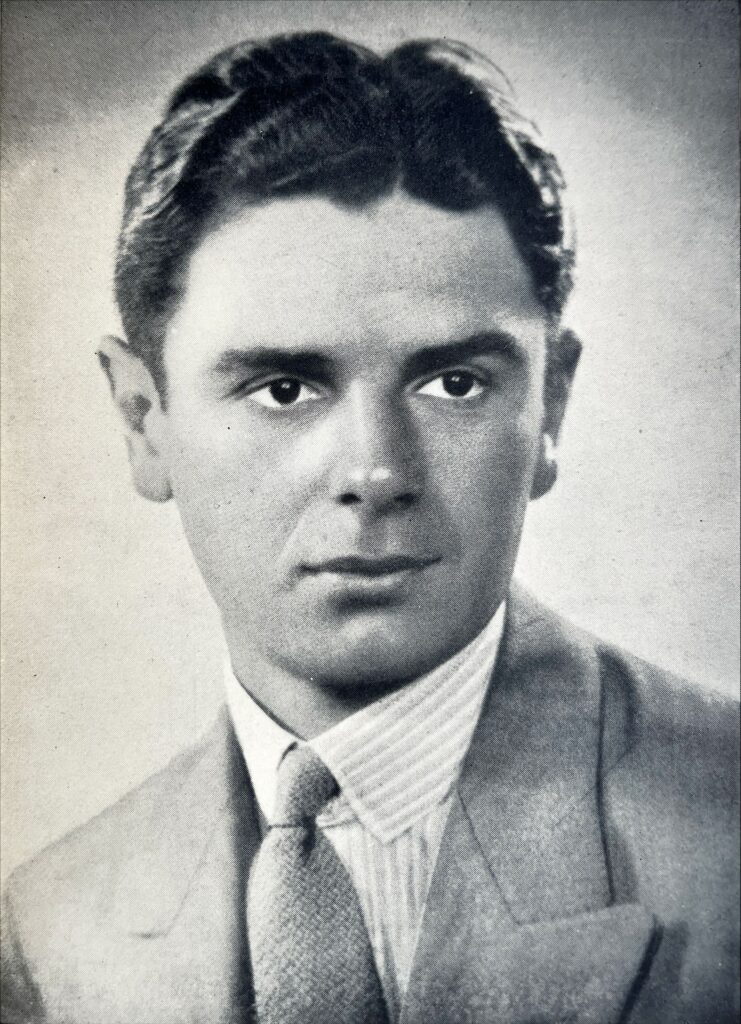
His first involvement with the theatre came with an American import. It began a sequence of collaborations with American writers seemingly at odds with the ‘English’ style for which Ellis would become celebrated. As he yearned to resist the influx of American shows in London, he became the go-to person to ‘spread a little Englishness’ over the music of musicals and revues of the era.
Mercenary Mary, 7th Oct 1925, 262 performances
As I say, the first musical was an American import, ‘Mercenary Mary’, based on an existing farce with music by Con Conrad & William B. Friedlander and lyrics by Friedlander with Isabel Leighton and Irving Caesar. The plot concerned a couple, Chris and Mary, who discover that their marriage might lose them an inheritance. They plan to stage an affair and divorce. The plan risks spinning out of control but in the end all is well.
It was produced by the same team who had had a success with the smash hit ‘No, No, Nanette’. They sensed another hit and revised the production for their new stars, including June (who, as June Tripp had been a child actor alongside Noel Coward). In her memoir, ‘The Glass Ladder’, she recalled the writers of ‘No, No Nanette’ coming on board alongside Ellis:
“Vincent Youmens, Irving Caesar and Vivian Ellis (a newcomer who would eventually compose whole scores for Cochran) wrote charming songs for me, and I enjoyed five rollicking months…”
I’m going to get sidetracked now, because June’s memoirs are a gossipy delight. During the show’s staged affair, Mary, played by comedienne Peggy O’Neil, becomes so nervous that she drinks too much and almost spoils everything. According to June, on more than one occasion O’Neil came pre-prepared:
“She… sometimes arrived at the theatre with one too many cocktails under her belt. Then poor young Sonnie Hale, who had to play an intimate supper scene with her, would quake in his shoes from curtain to curtain. One night Peggy managed to substitute real champagne for the ginger ale with which she must ply him, and he got so royally drunk that his understudy had to finish the show. Another time Peggy crawled under the supper table and refused to come out. The unsuspecting audience rolled with laughter at Sonnie’s attempt to extricate her, and, when he succeeded, Peggy marched down to the footlights and said to the spectators, ‘I’m bored, aren’t you? Let’s all go to my house and have a party!’”
Mr Cinders, 15th Jul 1929, 529 performances
Mr Cinders is now probably Vivian Ellis’ most famous work, not least because it contains the song ‘Spread A Little Happiness’ which has been recorded and re-recorded numerous times. Produced by Julian Wylie, the production starred Bobby Howes in the title role, a gender-swapped Cinderella. After a successful run of five months at the Adelphi it had become one of the biggest hits of the day and transferred to the Hippodrome to further acclaim.
It had been in development for a while before Ellis came on board. He had become one of music publisher Chappell’s contract writers when he was brought in to boost the score begun by Clifford Grey and Richard Myers.
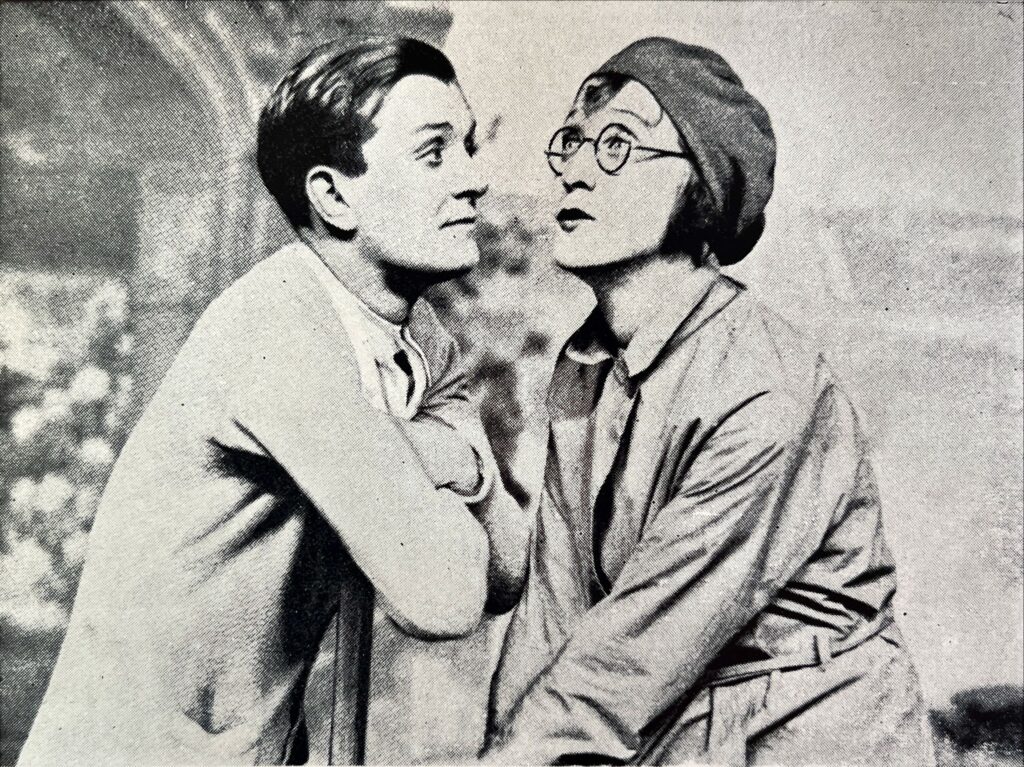
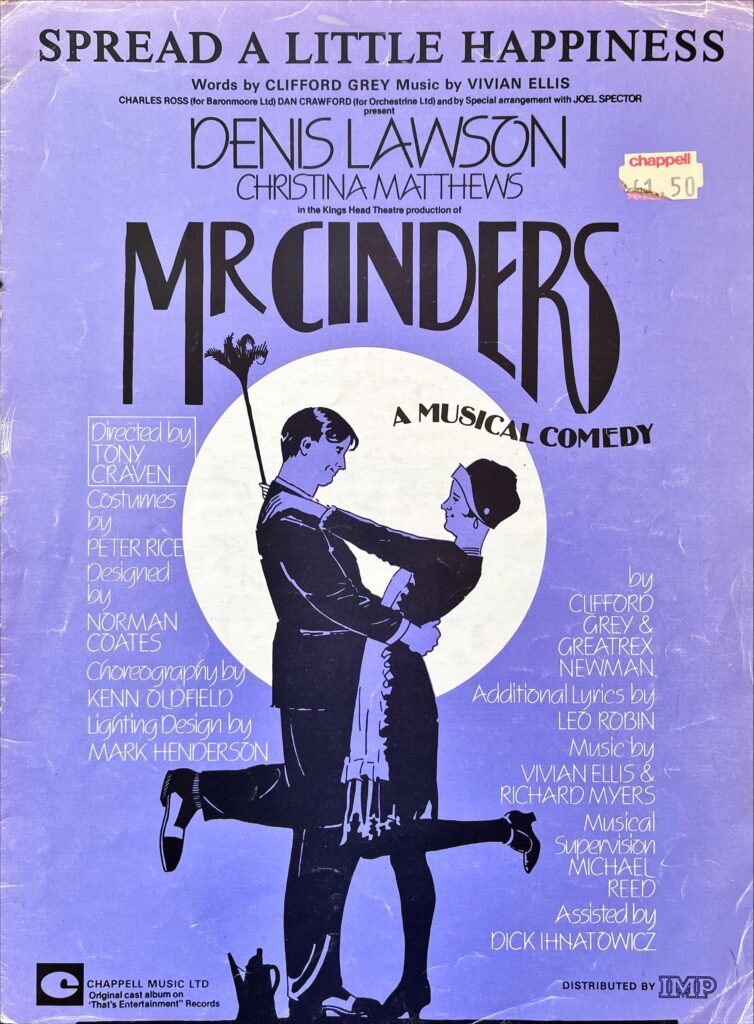
I knew Mr Cinders would be a success from the moment I read the script"
Howes had the successful comic number ‘On the Amazon’ but standout hit was ‘Spread A Little Happiness’. According to Ellis, it “had already been in ‘The Flower Princess’. Clifford Grey and I knew we might not easily write another like it, and made a situation for it in Mr Cinders. In its new context and with Binnie Hale in mind, I made certain changes in the original melody. I wanted it to have an underlying sadness and depth… ‘Spread A Little Happiness’ was never an easy song, but Binnie Hale handled it beautifully. I wrote her a special counter-melody in manuscript, and very wisely she kept it. My music publishing experiences had taught me the importance of trying to suit individual artists.”
Mr Cinders eventually closed after 529 performances. A film adaptation was made in 1934 and it was then largely forgotten until a revised 1983 revival.
Stand Up & Sing, March 5th 1931, 325 performances
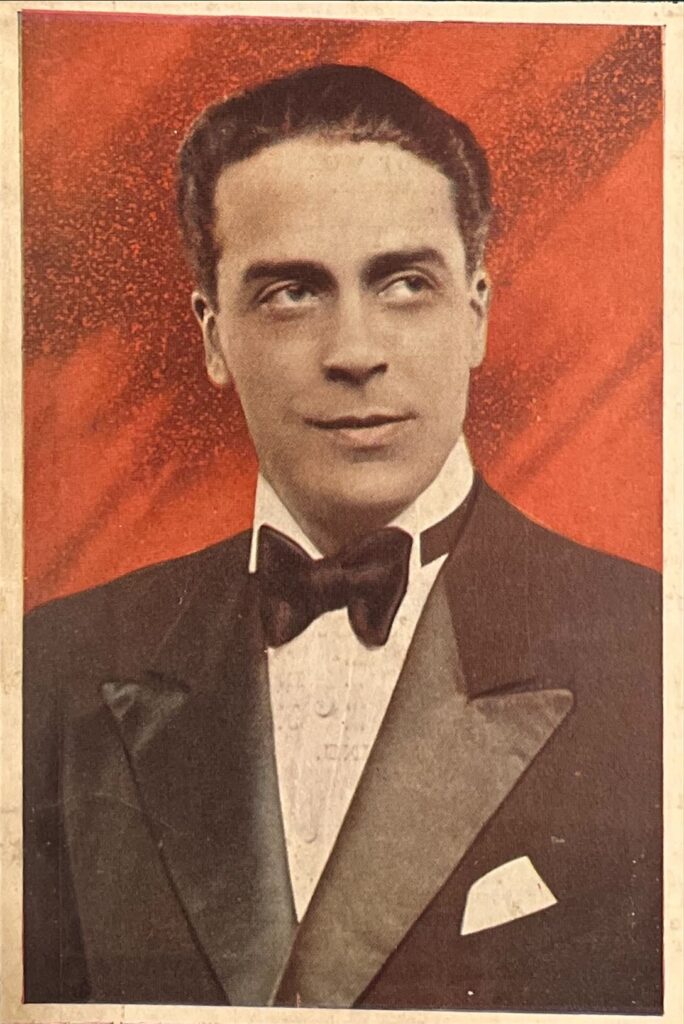
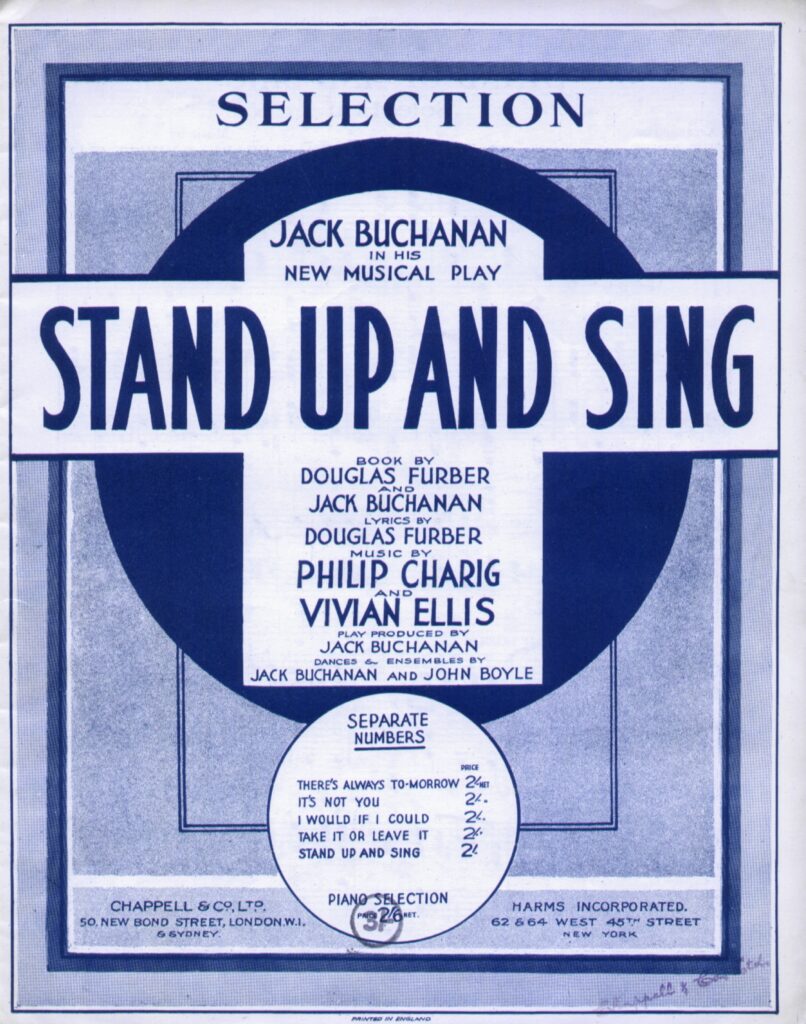
This was a follow up show for Jack Buchanan (one of the biggest stars of the day) composed by Phil Charig and a book by Buchanan and Douglas Ferber. Ellis was contracted to contribute five items, including a duet for Buchanan and Elsie Randolph that was cut before the production reached the Hippodrome.
Buchanan and Randolph were a valet and a maid who have to travel to Egypt to retrieve some very important papers belonging to the father of the love interest. The glamorous evening closed with papers retrieved and a large dance routine in top hat and tails.
The production also featured a young Anna Neagle in her first non-chorus role as the love interest. Vera Pearce did her usual ‘stomach dance’ with Buchanan who ‘ricochetted off her abdomen to everyone’s intense delight’.
It was an extravagant production with enormous star power and settled in for a long, successful run.
Out Of The Bottle, 11th Jun 1932, 109 performances
A less successful show, this one, with a book by Fred Thompson and Clifford Grey. It mixed modern characters with an old Eastern genie in a bottle. Like ‘Stand Up & Sing’, it was extravagant, this time full of stage effects to showcase the Genie’s magical powers. This score was written in co-operation with another American composer, Oscar Levant. By now, Ellis had made a name for himself as a catchy tunesmith and attaching his name to a score guaranteed a good time, but reviews were muted.
Ellis himself said “Out Of The Bottle, which should never have been uncorked, was founded on Anstey’s ‘The Brass Bottle’. The Brass, retained in the orchestra, plus the play’s close resemblance to a pantomime, must have struck Julian Wylie… as another potential Mr Cinders, but it only ran just over 100 performances. … The show was remarkable for two things; a song called ‘The King Tut Strut, which brought down Tutankhamen’s curse on everyone connected with it, and it was renamed ‘The Khoo Kha Khan’—whatever that may have meant—and the arrival… of Frances Day.”
Day was a daring young cabaret star, who would return to another Ellis score a few years later.
Hide & Seek, 14th Oct 1937, 204 performances
‘Hide & Seek’ marked the long-awaited return to the stage of comedienne Cicely Courtneidge. She starred in this alongside Bobby Howes. This time, Ellis was collaborating with Guy Bolton, Fred Thompson and Douglas Furber.
“Who hid what, and why they sought it, I cannot recall; but with Little Tommy Tucker and Out of The Bottle, it completed a trio of productions remembered for other reasons. It marked my final emancipation from and rejection of American influences and, partly on account of this, brought me closer to Cicely Courtneidge than at any other period in our long and happy association”
Ellis had to share the score writing with the polished American team of Lerner, Goodhart, and Hoffman who demonstrated their songs to Cicely Courtneidge and her director husband Jack Hulbert together one at the piano, one singing and the third joining in and beating time.
By contrast, Ellis was shy and quiet, worrying if they didn’t laugh immediately. In the end, they wrote the big songs with Ellis providing comedy numbers and material for Cis.
His most successful song however, was written for Howes. Courtneidge recalled: “Lee Ephraim came to me and said “Cis, I’ve got this very show for you called Hide and Seek… and as for the numbers, Vivian Ellis has never written better. He’s written Bobbie Howes the best number in the show.” Lee was quite right… and I shall never forget Bobbie singing… He has the quality which we in the profession describe as ‘Heart’.”
That song was ‘She’s My Lovely’ and there’s no doubt that it has endured longer than any other item from the show. So successful was it that it was interpolated into the 1980s revival of ‘Mr Cinders’.
Courtneidge & Howes opened the show as a couple of seaside pierrot troupe entertainers before an extended flashback where they played their parents. As a duo, it didn’t quite work, but it began a string of successful musicals for Courtneidge and a long association with Ellis.
The Fleet’s Lit Up, 17th Aug 1938, 199 performances
“I won’t share writing credits” – so said Vivian Ellis to producer/director George Black. Black agreed and offered him the next Hippodrome show, which became ‘The Fleet’s Lit Up’ (with his name in lights outside the theatre).
Frances Day returned to the Hippodrome to star, alongside comedian Stanley Lupino. The book was by Guy Bolton, Fred Thompson and Bert Lee, though there was hardly any plot. It was big and brash, part musical part extravaganza. It began at the Round Pond in Kensington Gardens, and after a newspaper office ballet, a sequence set in the mythical kingdom of Zabalon and a dream sequence with Adele Dixon as pirate Mary Read, it culminated in a review at Spithead by night to the title song. According to Kurt Ganzl, the show lasted over three hours and included stock gags, audience participation from Lupino and a full cabaret routine from Day.
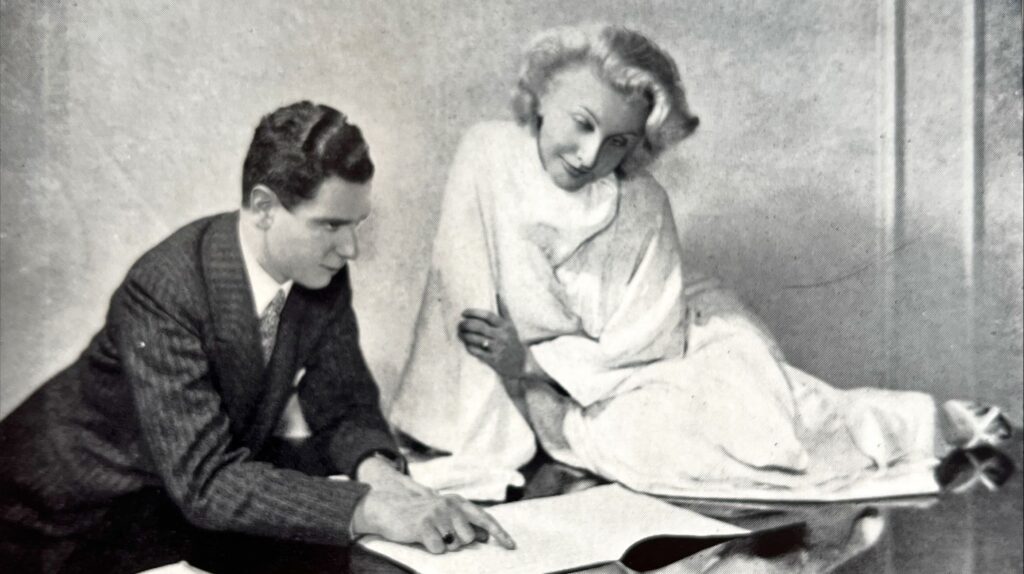
And so ends Vivian Ellis’ time at the Hippodrome, now a fully-fledged composer in his own right. He continued to have successful shows during and after the war, including the hit ‘Bless The Bride’. But that’s for another time.
Reading List
- ‘I’m On A See-Saw’, Vivian Ellis
- ‘Cicely’, Cicely Courtneidge
- ‘The Glass Ladder’, June
- ‘History of British Musical Vol 2’, Kurt Ganzl
- ‘The London Hippodrome: An Entertainment of Unexampled Brilliance’, Luci Gosling
